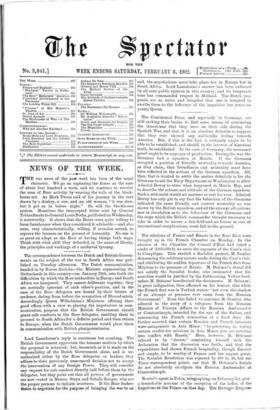The relations of France and Russia in the Near East
were brought up in the French Chamber on Monday. In the absence of the Chamber, the Conseil d'Etat had voted a credit of 3,000,000 fr. to cover the expenses of the Czar's visit to Compiegne. This excited a Socialist protest, M. Sembat denouncing the arbitrary arrests made during the Czar's visit, and attributing the sudden departure of the French fleet from Mitylene to the pressure of Russia. M. Delcasse's denial did not satisfy the Socialist leader, who insinuated that his assertion would be justified by the forthcoming Yellow-book unless M. Delcasse bowdlerised the documents. M. Delcasse, in great indignation, then affirmed on his honour that while the French fleet was in Turkish waters "not even the shadow of an attempt at pressure ever came from the Russian Government." Even this failed to convince M. Sembat, who adhered to the story of a telegram from the Russian Minister of Foreign Affairs to the Russian Ambassador at Constantinople, intended for the eye of the Sultan, and announcing the French evacuation at a fixed date. He further asserted that certain Russian and French interests were antagonistic in Asia Minor : "by persisting • in voting certain credits for missions in Asia Minor, you are entering into conflict with Russia." Here, however, M. Delcasso refused to be "drawn," contenting himself with the declaration that the discussion was futile, and that the expenditure had shown French hospitality, though discreet and simple, to be worthy of France and her august guest. The Socialist Resolution was rejected by 496 to 46, but the Times correspondent points out that M. Delcasse's denials do not absolutely exculpate the Russian Ambassador at Constantinople.










































